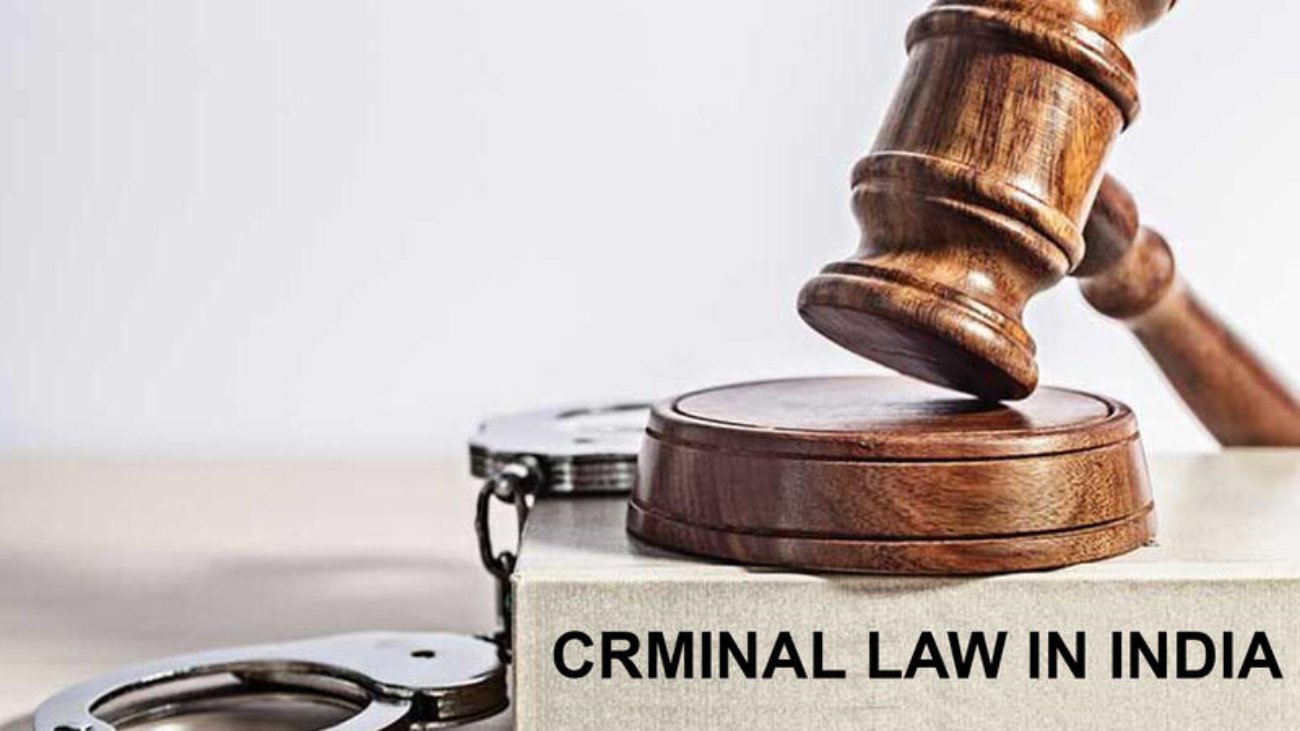What is Criminal Law in India?

Criminal law in India is the backbone of the legal framework designed to uphold law and order, protect citizens, and deter unlawful behavior. It encompasses the rules and procedures through which individuals who commit crimes are prosecuted and punished by the State. Unlike civil law, which deals with private disputes, criminal law concerns offenses against society at large.
The criminal justice system of India can be described as a blend of colonialism, constitutionalism as well as the contemporary reforms of the legal system, which has been gradually developing to align with the demands and the challenges facing the society. It does not just guarantee punishment of the criminal but also due process, fairness and safeguarding of individual rights.
The Indian criminal justice system is a blend of colonialism, constitutionalism, modern legal reforms, which are slowly transforming to respond to needs and problems in society. It not only provides punishment of crime, but it provides due process, fairness and protection of individual rights.
Legal Framework of Criminal Law in India
Criminal law in India is the body of law that defines criminal offences, regulates procedures for investigation and trial, and prescribes punishments for offenders. It is mainly governed by three key statutes:
Indian Penal Code (IPC), 1860
The IPC is the primary substantive criminal law in India. It defines various crimes such as murder, theft, assault, cheating, and more, along with their corresponding punishments. It is applicable across the country and forms the foundation of criminal liability.
Code of Criminal Procedure (CrPC), 1973
The CrPC provides the procedural framework for criminal trials and investigations. It outlines the process for filing FIRs, arrest procedures, bail, trial stages, and appeals. It ensures that criminal proceedings are conducted in a fair and just manner.
Indian Evidence Act, 1872
This Act governs the admissibility, relevance, and evaluation of evidence presented in criminal (and civil) trials. It lays down rules regarding burden of proof, witness examination, and types of evidence accepted in court.
Types of Criminal Law in India
In India, criminal offenses are broadly categorized based on their seriousness, the procedure required for investigation and trial, and the legal rights of the accused. Understanding these categories helps in grasping how the criminal justice system functions and how different cases are handled.
Substantive Criminal Law
This branch defines what constitutes a crime and prescribes the punishments. The Indian Penal Code (IPC), 1860 is the main law covering offences like murder, theft, assault, and fraud.
Procedural Criminal Law
It sets out the process for investigating and prosecuting crimes. The Code of Criminal Procedure (CrPC), 1973 regulates procedures such as arrest, investigation, trial, bail, and appeals, ensuring fair justice.
Special Criminal Laws
These laws address specific types of crimes not fully covered by the IPC. Examples include:
- Narcotic Drugs and Psychotropic Substances Act, 1985 (drug-related offences)
- Prevention of Corruption Act, 1988 (anti-corruption measures)
- Protection of Children from Sexual Offences (POCSO) Act, 2012 (child protection)
Cyber Crime Laws
With technological advancement, the Information Technology Act, 2000 addresses cyber offences like hacking, identity theft, and online fraud.
Economic Offences
These involve financial crimes such as money laundering, tax evasion, and corporate fraud, regulated under laws like the Prevention of Money Laundering Act (PMLA) and the Companies Act.
Juvenile Justice Laws
Special laws like the Juvenile Justice (Care and Protection of Children) Act, 2015 focus on offences committed by minors and their rehabilitation.
Investigation & Trial Process in Criminal Cases
Understanding the criminal investigation and trial process in India is essential for both legal professionals and common citizens.

Step-by-Step Criminal Process:
Investigation
The criminal justice process begins when a crime is reported to the police through an FIR or complaint. Police investigate by collecting evidence, questioning witnesses, and arresting suspects. After gathering sufficient evidence, they file a charge sheet to initiate court proceedings.
Cognizance and Summons
The court takes cognizance of the charge sheet and issues summons or warrants to the accused to appear in court. This step marks the formal start of the trial.
Trial Proceedings
During the trial, the accused is asked to plead guilty or not guilty. The prosecution presents evidence and witnesses, while the defense cross-examines and may present their own evidence. Both sides make closing arguments.
Judgment and Sentencing
The judge evaluates the evidence and delivers a verdict. If the accused is found guilty, the court pronounces a sentence according to the law.
Appeal Process
After conviction, either party may appeal to a higher court seeking a review or reversal of the judgment or sentence.
Rights of the Accused in Criminal Law in India
In the Indian criminal justice system, every accused person is presumed innocent until proven guilty. Indian law provides several constitutional and legal protections to ensure that justice is fair, transparent, and humane.
Key Rights of the Accused
Right to be Informed of the Charges
Every accused has the right to be informed promptly and clearly about the nature and cause of the accusation against them.
Right to Legal Counsel
The accused has the right to consult and be defended by a lawyer of their choice, and if unable to afford one, the court must provide legal aid.
Right to Fair and Speedy Trial
The accused is entitled to a fair trial without unnecessary delays to ensure justice is delivered promptly.
Right Against Self-Incrimination
No accused can be forced to testify against themselves or confess guilt under coercion.
Right to Presumption of Innocence
Until proven guilty, every accused is presumed innocent and must be treated accordingly.
Right to Bail
In bailable offenses, the accused has the right to be released on bail pending trial unless there are exceptional circumstances.
Role of Police and Judiciary in Criminal Law in India
The smooth functioning of the criminal justice system in India heavily depends on two pillars: the Police and the Judiciary.
Role of the Police in Criminal Law
The police are responsible for maintaining law and order, preventing crime, and investigating offenses. They register FIRs, collect evidence, arrest suspects, and submit charge sheets to the court. Police act as the first point of contact in the criminal justice system.
Role of Judiciary in Criminal Justice System
The judiciary interprets and applies the law impartially. Courts take cognizance of cases, conduct trials, ensure fair hearings, and deliver judgments. The judiciary safeguards the rights of all parties and ensures justice is served according to the law.
Recent Reforms Criminal Law in Indian (2023–2024)
India’s criminal justice system has witnessed significant reforms in 2023 and 2024 to make it more modern, efficient, and responsive to today’s challenges.

Introduction of New Criminal Codes
In 2023, the government introduced three new laws to replace the century-old colonial criminal statutes. These include the Bharatiya Nyaya Sanhita (BNS), which replaces the Indian Penal Code, the Bharatiya Nagarik Suraksha Sanhita (BNSS), which replaces the Code of Criminal Procedure, and the Bharatiya Sakshya Adhiniyam (BSA), which replaces the Indian Evidence Act. These new codes bring updated definitions of crimes, revised penalties, and modern procedural rules.
Focus on Speedy Justice
One of the main goals of these reforms is to ensure timely justice. The new laws aim to resolve cases within three years of the FIR registration, addressing the long-standing problem of delayed trials. This will help reduce the backlog of cases in courts and improve the efficiency of the justice delivery system.
Emphasis on Technology
The reforms integrate modern technology in the criminal justice process. For example, investigations and court proceedings must be video recorded, which helps improve transparency and prevents tampering with evidence. Digital case management systems are also encouraged to streamline processes.
Enhanced Protection for Vulnerable Groups
The new laws include special provisions to protect women, children, and marginalized communities. They also address contemporary issues such as cybercrime, human trafficking, and mob violence, reflecting the changing nature of crime in India.
Challenges in Implementation
While the reforms are promising, challenges remain in their uniform implementation across the country. Adequate training of police, prosecutors, and judges is essential. Infrastructure upgrades, especially in rural areas, are needed to support digital integration. There is also a need to balance speedy trials with the protection of the rights of the accused.
Challenges in the Indian Criminal Justice System
The Indian criminal justice system, despite its robust framework, faces several challenges that affect its efficiency, fairness, and credibility.
Case Backlog and Delays
One of the biggest problems is the enormous backlog of pending cases in courts across the country. Delays in trials lead to prolonged detention of accused persons and delay justice for victims. This backlog arises due to a shortage of judges, lawyers, and inadequate infrastructure.
Inadequate Police Infrastructure
The police force often struggles with understaffing, lack of modern training, and insufficient resources. This impacts the quality of investigations, sometimes resulting in weak evidence or wrongful arrests.
Corruption and Influence
Corruption within the police, prosecution, and judiciary undermines public trust in the system. External influence and political pressure can affect the impartiality of investigations and trials.
Rights of the Accused
Ensuring the rights of the accused, including fair trial, legal aid, and protection from torture or coercion, is a continuing challenge. Many accused persons, especially the poor, struggle to get proper legal representation.
Witness Protection Issues
Witnesses often face intimidation or threats, leading to reluctance or refusal to testify. The lack of a strong witness protection program hampers the prosecution of cases.
Outdated Laws and Procedures
Many laws and procedures are outdated and fail to address modern crimes like cybercrime, financial frauds, and organized crime effectively.
Overcrowded Prisons
Prisons in India are overcrowded, with many inmates awaiting trial due to slow judicial processes. Poor prison conditions raise human rights concerns.
Balancing Speed and Justice
While speedy trials are necessary, rushing cases can sometimes lead to compromised fairness and justice. Maintaining this balance is a significant challenge.
What is the difference between civil and criminal law?
Understanding the difference between civil and criminal law in India is essential for both legal awareness and everyday decision-making.
Civil Law
Definition:
Civil law governs disputes between individuals, organizations, or entities. It addresses conflicts involving private rights and duties.
Purpose:
The main aim of civil law is to resolve disputes and provide remedies, typically through compensation or specific performance, restoring the injured party to their original position.
Parties Involved:
The party initiating the case is known as the plaintiff, who claims to have been wronged, while the defendant is the party against whom the claim is made.
Burden of Proof:
In civil cases, the plaintiff must prove their case on a “balance of probabilities.” This means it is more likely than not that the plaintiff’s allegations are true.
Penalties:
Civil law usually results in monetary compensation or court orders (injunctions) requiring a party to do or refrain from doing something. There is no imprisonment or criminal penalty.
Laws Applicable:
Civil law covers areas such as contract law, property law, family law, tort law (personal injury), and other private matters.
Criminal Law
Definition:
Criminal law pertains to offenses considered harmful to society or the state, dealing with crimes that violate public order.
Purpose:
The primary purpose is to punish offenders, deter criminal behavior, and maintain social order and safety.
Parties Involved:
The prosecution, representing the state or government, brings the case against the accused person, known as the defendant.
Burden of Proof:
Criminal cases require proof “beyond reasonable doubt,” which is a much higher standard than in civil cases. This safeguards against wrongful convictions.
Penalties:
Punishments can include imprisonment, fines, probation, community service, or, in rare cases, the death penalty.
Laws Applicable:
Criminal law is governed by statutes like the Indian Penal Code (IPC), the Code of Criminal Procedure (CrPC), and the Indian Evidence Act.
Conclusion
Criminal law in India plays a vital role in maintaining law and order by defining offenses and prescribing punishments. Recent reforms aim to modernize the system, promote speedy justice, and enhance protections for vulnerable groups. However, challenges like delays, inadequate resources, and the need for effective implementation remain. Strengthening the criminal justice system through continued legal updates, technological integration, and training can ensure fair and timely justice for all, reinforcing public confidence and social stability in the country.


